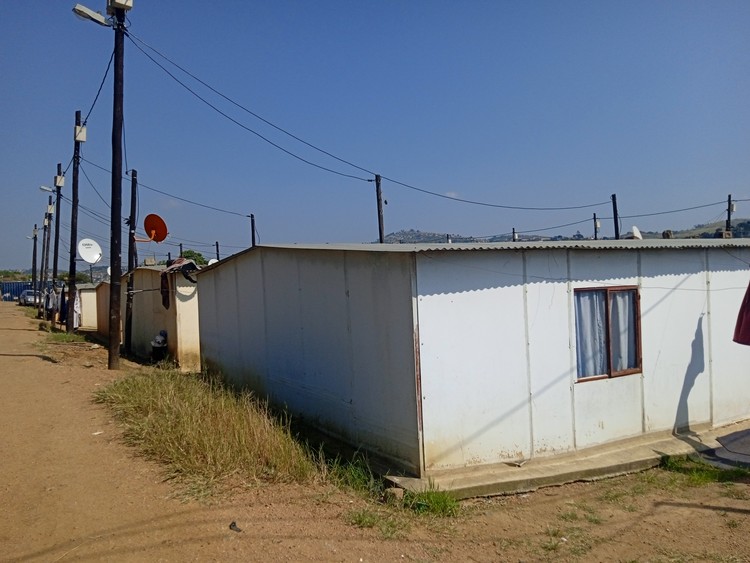
4 April 2023
The eThekwini Municipality moved families into this temporary residential accommodation to make way for a housing development over 11 years ago. Many have not yet been moved out and they say conditions here are getting worse. Photos: Nokulunga Majola
The Amaoti Transit Camp on Shellbrook Street in Amaoti, north of Durban, was intended as a temporary home for people who had to be moved from land earmarked for a housing development. But 11 years later, many of the families are still there, and their living conditions are getting worse.
Residents say the municipality is slow to respond to their complaints about water leaks, poor ablution facilities, illegal dumping, leaking roofs and cracking walls. There are about 360 people living in this camp who share 12 ablution blocks, housed in old containers. Each container has three toilet stalls and three showers. But only two of the 12 ablution blocks are at all functional. The rest are dilapidated and have broken doors, missing taps and floors. And in each of the two, only one toilet works.
Lindikhaya Mfeya lives in a one-room home in the camp with his wife and two children. He says they were promised that their move to the camp would only be temporary.
“We were told that we would only stay at the camp for six months, but it’s been more than 11 years now. Those who came here with young children are all grown up now,” said Mfeya.
“It’s like no one cares about us. We don’t have proper toilets. The ones we have are not in a good condition and are a safety hazard. We try to fix what we can, but the City needs to come to the table and help us,” he said.
This is one of the communal taps outside the ablution facilities. Residents say only two of the 12 ablution blocks are at all operational.
Another resident Bongani Thimiyane said, “The roof is leaking and walls are cracking. People are doing what they can to stop the cracks from spreading but the City needs to maintain it.”
When GroundUp visited the camp on Sunday, people were doing their laundry at the outside communal taps. There was water leaking from a pipe where residents collect their drinking water.
Amaoti Transit Camp committee chairperson, Nontethelelo Ndleleni, said that they have not been given refuse bags so residents have created illegal dumps in spaces around the camp. She urged the City to intervene as a matter of urgency.
GroundUp sent questions to the municipality about the conditions at the camp, including the piles of uncollected rubbish, last week. By Sunday, officials from the Solid Waste department visited the camp and distributed black bags for refuse collection.
Head of Communications at eThekwini Municipality, Lindiwe Khuzwayo, said the people living in the camp would be relocated in phases once new houses had been built in the Amoati Cuba housing project. She said phase 1 of the housing project had been completed with 166 houses. “Phase 2 has encountered challenges such as vandalism. We have also identified more land for development, and this is currently in the feasibility stages. Relocation of people living in the camps will occur in phases once the new houses have been built.
“We will attend to the concerns regarding the maintenance and refuse collection,” she said.
Residents say the municipality has not been maintaining these units which now have broken doors, windows and large cracks and gaps in the walls.